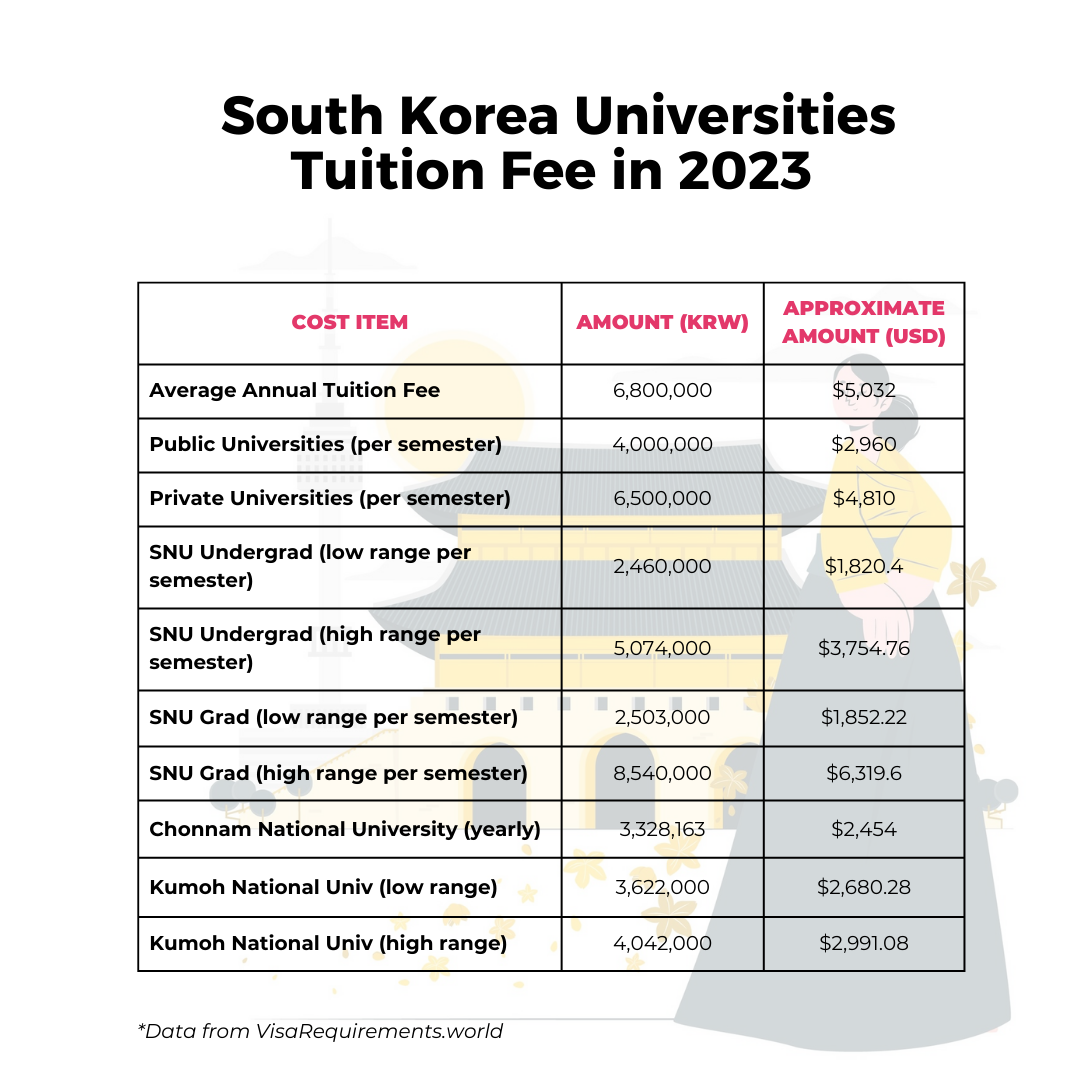
When it comes to overseas studies, South Korea is definitely among the most top-notch countries around the globe. International students can not only be taught in a professional environment, but also be able to immerse themselves in a new vibrant culture and irresistible cuisine. However, it is crucial to have a solid understanding of the budget essentials before embarking on this journey.
From tuition fees to living expenses, this article will provide you with all the detailed information to plan for your study abroad adventure in South Korea.
Visa fees to set foot in South Korea
The D-2 Visa, commonly referred to as the South Korea Student Visa, is granted to global students seeking to pursue either undergraduate or postgraduate studies at an educational institution in South Korea.
For language training purposes, South Korea also grants Language Trainee Visa (D-4) for international students who want to study Korean or another foreign language at a language institution affiliated with a foreign educational institution or a Korean university education center.
The visa applications for studying abroad in South Korea can cost KRW 120,000 or USD 88.50, exclusive of processing fees, health insurance, consular fees, translation services, etc.
Tuition costs can be varying
Studying in South Korea is considered to be more budget-friendly for students compared to other countries such as Australia or the US. The average university tuition fees in South Korea for the year 2023 are approximately KRW 6.8 million, equivalent to around USD 5.032.
Depending on your schools (public or private) and whether you apply by yourself (direct enrollment) or via a sponsorship, your cost of studying can be drastically different.
Here is a list of fees for international students of several universities in South Korea.

Scholarship
In an effort to attract more international students, South Korea is actively providing a range of scholarships to encourage more applications to study in the country. There are 4 types of South Korean scholarships for students, some of them may cover your tuition fees and monthly living expenses.
Scholarships from Korean universities
Korean Government Scholarship
Scholarships offered from organizations, businesses, and corporates
Professor Scholarship
However, you also have to ensure that you can meet general requirements and specific requirements of different scholarships.
General requirements includes but not limited to:
You and your parents do not have Korean nationality.
Have good health both physically and mentally to study in Korea.
Not currently studying any program in Korea. However, if you have received a Korean government scholarship before and are nominated by the Embassy, you can reapply for the scholarship only once.
GPA at the highest level of study at least 3.2/4.0.
Cost of living for international students
This factor is also affected by where you are living and your lifestyle, for example, the capital city - Seoul housing and utilities costs are definitely higher than the suburbs’. As a student, you can have various choices, such as living in dorms, sharing an apartment with peers or renting an individual apartment, depending on their budget.
According to Numbeo, the average cost of living in South Korea ranks 19th in 2023 Mid-year including groceries, restaurants, transportation, and utilities. The rent index is 17.4, suggesting the average rental prices in South Korea are approximately 80% lower than those in New York City. Therefore, students based on the location of residence and their individual preferences will need to spend around USD 1.300 and USD 1800 per month.
From understanding visa costs to estimating living expenses, you can confidently navigate the financial landscape effectively and focus on your studies and the rich cultural experiences that South Korea has to offer.
Some budgeting tips for students
Tip 1: Utilize student discounts. In South Korea, many services such as public transportation, entertainment, restaurants, etc offer discounts to students, thus make sure to take advantage of them.
Tip 2: Stop eating out. You can save money by purchasing fresh ingredients with cheaper prices compared to ready-to-eat meals. Try this tip and you will be surprised by how much cost you have reduced.
Tip 3: Buy used products. It can be textbooks or even clothing, and you have a wide variety of options to choose, from the library or fellow students, or thrifting stores.
Tip 4: Work part-time jobs. A lot of international students opt to find part-time job opportunities on or off-campus to support themselves financially. You have to ensure it doesn't interfere with your studies and your health.